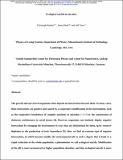| dc.contributor.author | Ratzke, Christoph | |
| dc.contributor.author | Denk, Jonas | |
| dc.contributor.author | Gore, Jeff | |
| dc.date.accessioned | 2019-05-29T15:32:50Z | |
| dc.date.available | 2019-05-29T15:32:50Z | |
| dc.date.issued | 2018-04 | |
| dc.date.submitted | 2017-08 | |
| dc.identifier.issn | 2397-334X | |
| dc.identifier.uri | https://hdl.handle.net/1721.1/121176 | |
| dc.description.abstract | The growth and survival of organisms often depend on interactions between them. In many cases, these interactions are positive and caused by a cooperative modification of the environment. Examples are the cooperative breakdown of complex nutrients in microbes or the construction of elaborate architectures in social insects, in which the individual profits from the collective actions of her peers. However, organisms can similarly display negative interactions by changing the environment in ways that are detrimental for them, for example by resource depletion or the production of toxic byproducts. Here we find an extreme type of negative interactions, in which Paenibacillus sp. bacteria modify the environmental pH to such a degree that it leads to a rapid extinction of the whole population, a phenomenon that we call ecological suicide. Modification of the pH is more pronounced at higher population densities, and thus ecological suicide is more likely to occur with increasing bacterial density. Correspondingly, promoting bacterial growth can drive populations extinct whereas inhibiting bacterial growth by the addition of harmful substances-such as antibiotics-can rescue them. Moreover, ecological suicide can cause oscillatory dynamics, even in single-species populations. We found ecological suicide in a wide variety of microbes, suggesting that it could have an important role in microbial ecology and evolution. | en_US |
| dc.publisher | Nature Publishing Group | en_US |
| dc.relation.isversionof | http://dx.doi.org/10.1038/S41559-018-0535-1 | en_US |
| dc.rights | Article is made available in accordance with the publisher's policy and may be subject to US copyright law. Please refer to the publisher's site for terms of use. | en_US |
| dc.source | bioRxiv | en_US |
| dc.title | Ecological suicide in microbes | en_US |
| dc.type | Article | en_US |
| dc.identifier.citation | Ratzke, Christoph et al. “Ecological Suicide in Microbes.” Nature Ecology & Evolution 2, 5 (April 2018): 867–872 © 2018 The Author(s) | en_US |
| dc.contributor.department | Massachusetts Institute of Technology. Department of Physics | en_US |
| dc.contributor.department | Massachusetts Institute of Technology. Department of Biology | en_US |
| dc.relation.journal | Nature Ecology & Evolution | en_US |
| dc.eprint.version | Author's final manuscript | en_US |
| dc.type.uri | http://purl.org/eprint/type/JournalArticle | en_US |
| eprint.status | http://purl.org/eprint/status/PeerReviewed | en_US |
| dc.date.updated | 2019-03-25T20:08:07Z | |
| dspace.orderedauthors | Ratzke, Christoph; Denk, Jonas; Gore, Jeff | en_US |
| dspace.embargo.terms | N | en_US |
| dspace.date.submission | 2019-04-04T11:11:55Z | |
| mit.license | PUBLISHER_POLICY | en_US |
| mit.license | PUBLISHER_POLICY | |
